九年级英语下册 Module 4 Unit 2 We must keep the camp clean教案
外研版英语九年级下册:Module4 Unit 2 We must keep the camp clean 教案
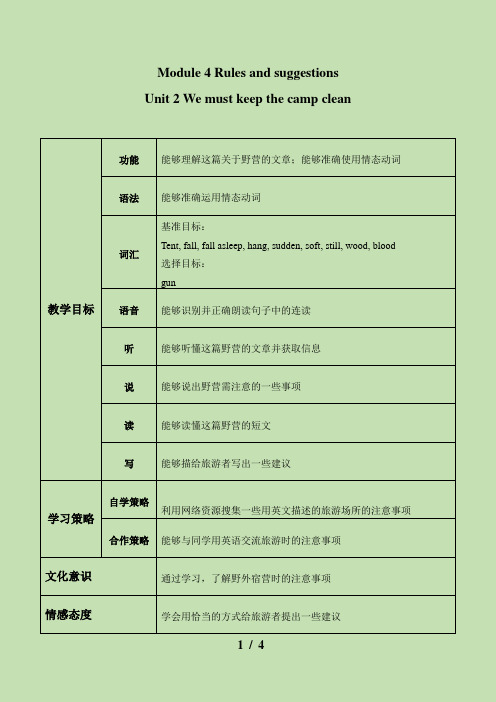
Module 4 Rules and suggestions Unit 2 We must keep the camp clean教学目标功能能够理解这篇关于野营的文章;能够准确使用情态动词语法能够准确运用情态动词词汇基准目标:Tent, fall, fall asleep, hang, sudden, soft, still, wood, blood选择目标:gun语音能够识别并正确朗读句子中的连读听能够听懂这篇野营的文章并获取信息说能够说出野营需注意的一些事项读能够读懂这篇野营的短文写能够描给旅游者写出一些建议学习策略自学策略利用网络资源搜集一些用英文描述的旅游场所的注意事项合作策略能够与同学用英语交流旅游时的注意事项文化意识通过学习,了解野外宿营时的注意事项情感态度学会用恰当的方式给旅游者提出一些建议教学重难点To learn some rules and suggestions in the passage.To get information from the article.教学媒体多媒体课件单机版网络教学光盘教学方法本单元的教学以任务型教学法为主,以视听教学法、互动教学法为辅,各个难度任务布置贯穿于教学始终,教师在每个教学环节中巧妙设置情境,力求使学生在真实的语境中感知语言的发生和运用,通过师生互动,生生互动等活动方式,学生产生由观察、倾听、理解到运用的变化,从而内化语言知识和技能,促进教学目标的达成。
教学过程设计意图Step 1 Lead-inLook at the pictures and answer the questions.Are you afraid of bears?Can bears run very fast in the forest?Can bears climb the tree?Can they smell food from far away?What should we do when we meet a bear?Step 2 Consolidate new words and expressionsLook and say. The teacher shows the pictures of new words or expressions and let the students to say as quickly as possible.tent n. 帐篷fall v. 摔倒hang v. 悬挂sudden adj. 突然的gun n. 枪soft adj. 软的still adj. 静止的;不动的wood n. 树林blood n. 血;血液fall asleep 入睡;睡着Step 3 Pre-readingLook at the picture and answer the questions.1. What is the bear doing?2. What do you think the people in the tent should do? 利用图片,引起学生的学习兴趣,师生问答练习,为下一步做出铺垫。
九年级英语下册Module4RulesandsuggestionsUnit2Wemustkeepth
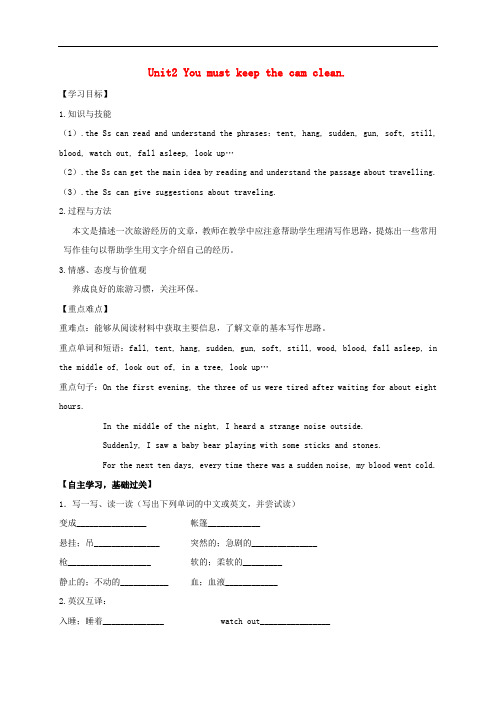
Unit2 You must keep the cam clean.【学习目标】1.知识与技能(1).the Ss can read and understand the phrases:tent, hang, sudden, gun, soft, still, blood, watch out, fall asleep, look up…(2).the Ss can get the main idea by reading and understand the passage about travelling. (3).the Ss can give suggestions about traveling.2.过程与方法本文是描述一次旅游经历的文章,教师在教学中应注意帮助学生理清写作思路,提炼出一些常用写作佳句以帮助学生用文字介绍自己的经历。
3.情感、态度与价值观养成良好的旅游习惯,关注环保。
【重点难点】重难点:能够从阅读材料中获取主要信息,了解文章的基本写作思路。
重点单词和短语:fall, tent, hang, sudden, gun, soft, still, wood, blood, fall asleep, in the middle of, look out of, in a tree, look up…重点句子:On the first evening, the three of us were tired after waiting for about eight hours.In the middle of the night, I heard a strange noise outside.Suddenly, I saw a baby bear playing with some sticks and stones.For the next ten days, every time there was a sudden noise, my blood went cold. 【自主学习,基础过关】1.写一写、读一读(写出下列单词的中文或英文,并尝试读)变成________________ 帐篷____________悬挂;吊_______________ 突然的;急剧的_______________枪___________________ 软的;柔软的_________静止的;不动的___________ 血;血液____________2.英汉互译:入睡;睡着______________ watch out________________整理__________________ in the middle of the night______________使我们安全____________ on our first evening____________在树上______________ put up__________________make…clean______________ above all__________________reach out_____________ every time_______________3.我的疑惑:【合作探究,释疑解惑】1.教师设置一些阅读技巧方面的问题,让学生带着问题理解文章。
初中英语外研版九年级下册《Module 4 Unit 2 We must keep the camp

Finish the tasks.
time
see
do
in the morning The bag of the hang the food food was open in the tree
later that day
7 “It wasn't high enough. Bears can climb trees. They can smell food from a long way away,” said Ben.
8 “We must keep the camp clean,” I said. “Bears might think our rubbish is food.”
Read the part 2.Then finish the following tasks.
3 In the morning, I got up to make breakfast. The bag of food was open.
4 “Bears,” said Joe. “We should hang the food in a tree tonight.”
Reading task2
Read the part 1.Then finish the following tasks.
Watch out! Bears about!
1 On the first evening, the three of us were tired after walking for about eight hours. We soon fell asleep. 2 In the XXX of the night, I heard a strange noise outside. But when I looked out of the tent, there was nothing there.
九年级英语下册Module4Unit2Wemustkeepthecampclean知识清单+练习题(无答案)(新版)外研版
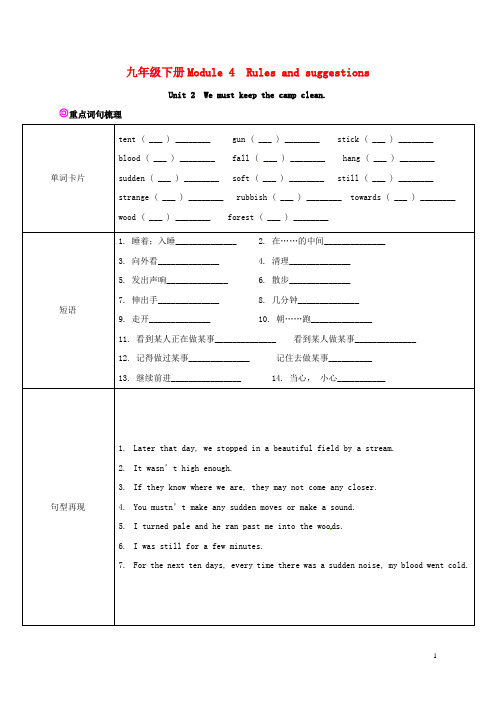
九年级下册Module 4 Rules and suggestionsUnit 2 We must keep the camp clean.重点词句梳理单词卡片tent ( ___ ) ________ gun ( ___ ) ________ stick ( ___ ) ________ blood ( ___ ) ________ fall ( ___ ) ________ hang ( ___ ) ________ sudden ( ___ ) ________ soft ( ___ ) ________ still ( ___ ) ________ strange ( ___ ) ________ rubbish ( ___ ) ________ towards ( ___ ) ________ wood ( ___ ) ________ forest ( ___ ) ________短语1. 睡着;入睡______________ 2. 在……的中间______________3. 向外看______________4. 清理______________5. 发出声响______________6. 散步______________7. 伸出手______________ 8. 几分钟______________9. 走开______________ 10. 朝……跑______________11. 看到某人正在做某事______________ 看到某人做某事______________12. 记得做过某事______________ 记住去做某事__________13. 继续前进________________ 14. 当心,小心___________句型再现ter that day, we stopped in a beautiful field by a stream.2.It wasn’t high enough.3.If they know where we are, they may not come any closer.4.You mustn’t make any sudden moves or make a sound.5.I turned pale and he ran past me into the woo ds.6.I was still for a few minutes.7.For the next ten days, every time there was a sudden noise, my blood went cold.Module 4 Unit 1 We must keep the camp clean.堂堂清一、用所给词的适当形式填空1. We were tired after ___________ (walk) for about eight hours.2. Did you see a man ___________ (fish) near the lake at eight yesterday morning?3. While my father ____________ (read) the newspaper, I went out for a walk.4. Red lanterns are often ___________ (hang) along the streets before the Spring Festival.5. I was so ___________ (sleep) at that time that I fell ___________ (sleep) quickly.6. When there was a ___________ (suddenly) noise, I didn’t know what happened.7. A rabbit ran past me into the ___________ (wood).8. Every time my mother ___________ (hear) this music, she will think of her childhood.9. I remember ___________ (see) the strange man in my town last Sunday.10. ___________ (sudden), we heard a loud noise outside the classroom.二、用方框中所给词或短语的适当形式填空。
九年级英语下册module4rulesandsuggestionsunit2wemustkeepth
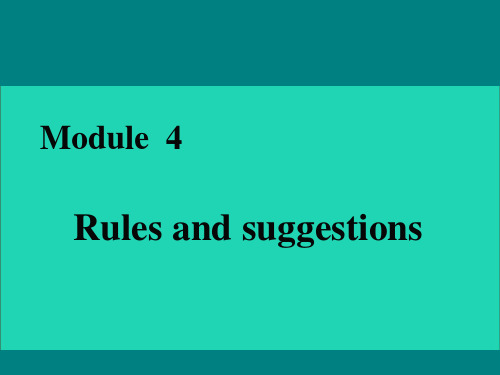
Rules and suggestions
Unit 2
4
We must keep the camp
clean.
Review
Revision
Translate the phrases into English.注意源自pay attention出发
set off
穿合适的衣服 wear proper clothes
Presentation
Read the passage and answer the question.
How much do they know about bears?
They know bears can climb trees and they know that bears can smell food from a long way away. They also know that if they see a bear, they mustn’t make sudden moves or make a sound and they mustn’t run.
山路的边缘
the edge of the hill path
伤到自己
hurt oneself
在一起; 协同一致 keep together
Review
走失;迷路 离开 独立地 一口气;一下子 注意…;留心… 引路; 带路
get lost go off on one’s own in one go be careful of lead the way
Presentation
Say where it is. Lushan National Park is in Jiangxi Province.
外研版(新标准)英语九年级下册M4 Unit 2 We must keep the camp clean教学设计
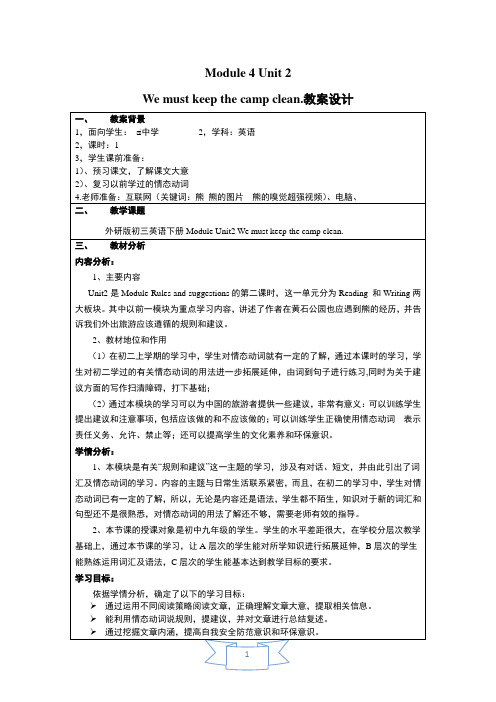
Module 4 Unit 2We must keep the camp clean.教案设计学习重点:重点单词:valley, peaceful, site, gesture...重点短语:watch out, fall asleep, reach out重点句子:We fell asleep listening to the sound of water...学习难点:熟练、准确地运用本单元所学的单词、短语及句型结构。
教学准备:1、在百度中搜索本课资料2、录音机、录音带,多媒体教学方法:问题式导学法、分层次教学法、任务型教学法等。
四、教学过程I、导入新课1.Why must we keep the camp clean?➢To protect the environment.➢To help keep the bears away from us. (Play a video to show the reason)2.Bears are dangerous animals, have you ever got a close contact with them? Three young men went to the Yellowstone Park in America for camping. And they met bears, let’s see what happened.II、Fast readingRead the passage and finish the tasks.1.Who got a close contact with the bears?_________________________________________.2.Devide the passage into four parts according to the timeline.III、Careful reading1.Read the first part and finish the tasks.1).What did they do on the first evening ?2).What did they hear and see in the middle night?2.Read the second part and finish the tasks.1)Complete the table.What happened What they should do or shouldn’t doIn the middle of the first night, they_______________ outside. And the bagof food ________They should _____________________During the second night, the bears______________ and ______________from the tree.They should ____________________________and ________________________________________________________2)After reading this part, try to find how much the three man know about the bears.。
九年级英语下册Module4RulesandsuggestionsUnit2Wemustkeept
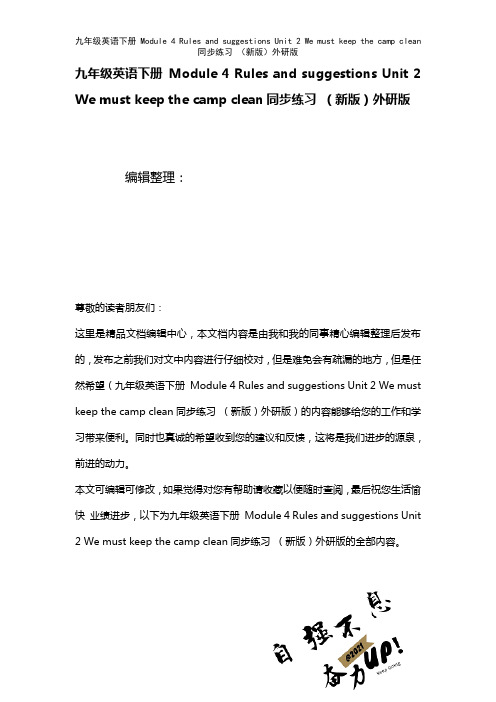
九年级英语下册Module 4 Rules and suggestions Unit 2 We must keep the camp clean同步练习(新版)外研版编辑整理:尊敬的读者朋友们:这里是精品文档编辑中心,本文档内容是由我和我的同事精心编辑整理后发布的,发布之前我们对文中内容进行仔细校对,但是难免会有疏漏的地方,但是任然希望(九年级英语下册Module 4 Rules and suggestions Unit 2 We must keep the camp clean同步练习(新版)外研版)的内容能够给您的工作和学习带来便利。
同时也真诚的希望收到您的建议和反馈,这将是我们进步的源泉,前进的动力。
本文可编辑可修改,如果觉得对您有帮助请收藏以便随时查阅,最后祝您生活愉快业绩进步,以下为九年级英语下册Module 4 Rules and suggestions Unit 2 We must keep the camp clean同步练习(新版)外研版的全部内容。
Module 4 Unit 2We must keep the camp clean。
同步练习◆Ⅰ. 根据汉语提示完成句子1。
Before it gets dark, the campers must put up their ________(帐篷) in a field.2。
The wounded man was covered with ________(血迹).3。
Would you like some wine or something ________(软的)?4. The boy jumped up in surprise at the ________(突然的) noise. 5。
I’ve been wondering where to ________(挂) my new picture.◆Ⅱ. 从方框中选择适当的短语, 并用其正确形式填空tidy up; go to sleep; look up; above all;reach out; no one; fall asleep; look out;play with; put up1. ________! There's a car coming.2。
外研版九年级英语下册教学设计《Module4Unit2Wemustkeepthecampclean》
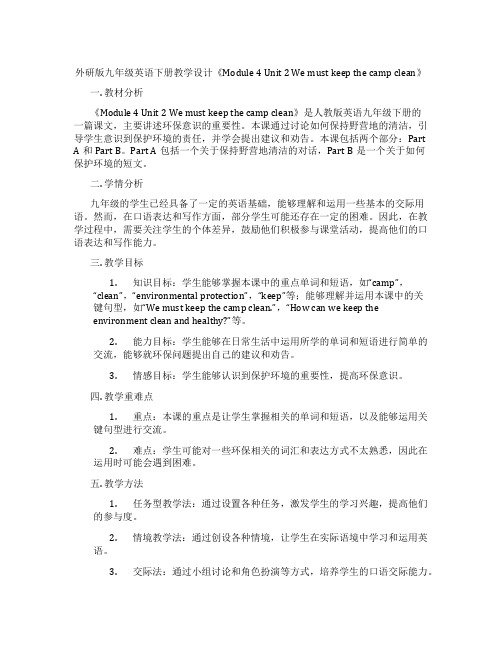
外研版九年级英语下册教学设计《Module 4 Unit 2 We must keep the camp clean》一. 教材分析《Module 4 Unit 2 We must keep the camp clean》是人教版英语九年级下册的一篇课文,主要讲述环保意识的重要性。
本课通过讨论如何保持野营地的清洁,引导学生意识到保护环境的责任,并学会提出建议和劝告。
本课包括两个部分:Part A和Part B。
Part A包括一个关于保持野营地清洁的对话,Part B是一个关于如何保护环境的短文。
二. 学情分析九年级的学生已经具备了一定的英语基础,能够理解和运用一些基本的交际用语。
然而,在口语表达和写作方面,部分学生可能还存在一定的困难。
因此,在教学过程中,需要关注学生的个体差异,鼓励他们积极参与课堂活动,提高他们的口语表达和写作能力。
三. 教学目标1.知识目标:学生能够掌握本课中的重点单词和短语,如“camp”,“clean”,“environmental protection”,“keep”等;能够理解并运用本课中的关键句型,如“We must keep the camp clean.”,“H ow can we keep theenvironment clean and healthy?”等。
2.能力目标:学生能够在日常生活中运用所学的单词和短语进行简单的交流,能够就环保问题提出自己的建议和劝告。
3.情感目标:学生能够认识到保护环境的重要性,提高环保意识。
四. 教学重难点1.重点:本课的重点是让学生掌握相关的单词和短语,以及能够运用关键句型进行交流。
2.难点:学生可能对一些环保相关的词汇和表达方式不太熟悉,因此在运用时可能会遇到困难。
五. 教学方法1.任务型教学法:通过设置各种任务,激发学生的学习兴趣,提高他们的参与度。
2.情境教学法:通过创设各种情境,让学生在实际语境中学习和运用英语。
3.交际法:通过小组讨论和角色扮演等方式,培养学生的口语交际能力。
九年级英语下册Module4Unit2Wemustkeepthecampclean教案新版外研版

Unit 2 We must keep the camp clean.【教学目标】●Knowledge objectiveKey vocabulary—tent, fall, hang, sudden, gun, soft, still, wood, blood Key structures—fall asleep●Ability objectiveTo get information about the outside camping.●Moral objectiveTo know more about other life rules and protect ourselves better.【教学重点】To learn some rules and suggestions in the passage.【教学难点】To get information from the article.【教学方法】PWP method, task-based method【教学手段】A tape recorder, multimedia and some pictures【教学过程】Teaching ProceduresStep 1 Lead-inLook at the pictures and answer the questions.Are you afraid of bears?Can bears run very fast in the forest?Can bears climb the tree?Can they smell food from far away?What should we do when we meet a bear?Step 2 Consolidate new words and expressionsLook and say. The teacher shows the pictures of new words or expressions and let the students to say as quickly as possible.tent n. 帐篷fall v. 摔倒hang v. 悬挂sudden adj. 突然的gun n. 枪soft adj. 软的still adj. 静止的;不动的wood n. 树林blood n. 血;血液fall asleep 入睡;睡着Step 3 Pre-readingLook at the picture and answer the questions.1. What is the bear doing?2. What do you think the people in the tent should do?Step 4 ListeningListen to Part 2 and answer the questions.1. What did they feel after walking for about eight hours?2. Who opened the bag of food?Keys: They were tired.The bear.Step 5 Reading1. Read the passage and answer the questions.1) Where do you think is the best place to keep food safe from bears?2) What was the noise behind the writer?3) Do you think their camping trip was interesting?2. Read the passage and complete the table.What happened What they should or should not do In the middle of the first night, thewriter heard a _____________ outside. Andthe bag of food ___________.They should ____________________.During the second night, the bears came again and ___________ from the tree. They should _________________ and ________________.On the fourth day, the writer saw _____________________________________________. Then _________ came. He should not ____________________ _________________________________.3. Complete the passages with the words in the boxblood gun sticks suddenOn the third day of our camping trip, Ben told us that if we saw a bear, we should not make any (1) _______ moves. We did not have a (2) _______ to keep ourselves safe. The next day, I saw a baby bear playing with some (3) ________ and stones.His mother arrived soon, and I was so afraid that my (4) _______ went cold. I did not move until the bears walked away. Then I ran back to my friends as fast as I could.Keys: sudden gun sticks bloodRead the passage and fill in the blanks according to the passage.Step 6 Language pointsTo learn about the main points in the passage.1. On the first evening, the three of us were tired after walking for about eighthours.on the first evening表示“在第一个晚上”,当表示具体某一天的早上、中午或晚上是,要用介词on。
Module4Unit2wemustkeepthecampclean教案九年级英语下册
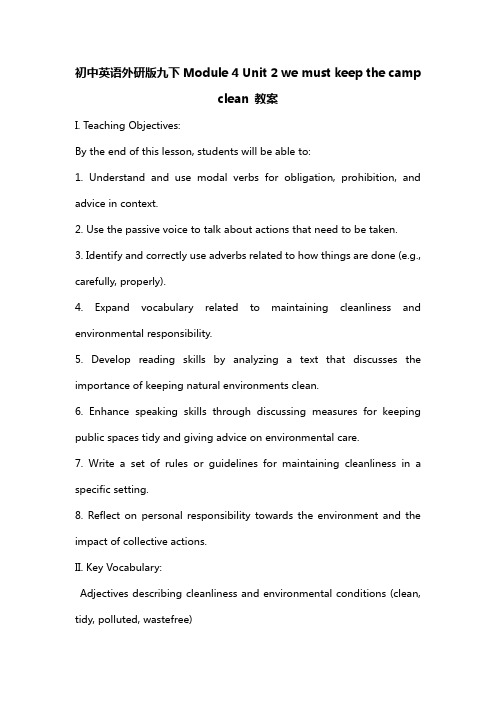
初中英语外研版九下Module 4 Unit 2 we must keep the campclean 教案I. Teaching Objectives:By the end of this lesson, students will be able to:1. Understand and use modal verbs for obligation, prohibition, and advice in context.2. Use the passive voice to talk about actions that need to be taken.3. Identify and correctly use adverbs related to how things are done (e.g., carefully, properly).4. Expand vocabulary related to maintaining cleanliness and environmental responsibility.5. Develop reading skills by analyzing a text that discusses the importance of keeping natural environments clean.6. Enhance speaking skills through discussing measures for keeping public spaces tidy and giving advice on environmental care.7. Write a set of rules or guidelines for maintaining cleanliness in a specific setting.8. Reflect on personal responsibility towards the environment and the impact of collective actions.II. Key Vocabulary:Adjectives describing cleanliness and environmental conditions (clean, tidy, polluted, wastefree)Nouns related to waste management and environmental protection (rubbish, recycling, disposal)Verbs associated with cleaning and maintenance (sweep, collect, dispose, recycle)Adverbs indicating how actions are performed (properly, carefully, thoroughly)III. Target Language Structures:Modal verbs (must, should, ought to) for expressing obligation and remendation.Passive voice to talk about actions that need to be taken by people in general ("Trash must be disposed of properly").Adverbs for adding details on how actions are carried out.IV. Teaching Aids:Images or videos showing the consequences of not keeping public spaces clean.Whiteboard and markers for grammar explanation and writing key sentences.Audio material featuring dialogues or discussions about cleanliness and environmental care.Handouts with exercises on modal verbs, passive voice, adverbs, new vocabulary, and a writing prompt for creating cleanliness guidelines. V. Teaching Procedures:Step 1: Warmup (5 minutes)Begin with a quick discussion about the importance of cleanliness in everyday life and the consequences of neglecting it.Elicit key vocabulary from students and write it on the board.Step 2: Listening (10 minutes)Play an audio track that presents scenarios where cleanliness is crucial for health and safety.After listening, ask prehension questions to check understanding of the content.Step 3: Speaking Practice (15 minutes)Students work in pairs or small groups to discuss ways they can contribute to keeping their school, munity, or campground clean. Conduct a class activity where each group shares their ideas and creates a list of suggestions for a clean environment.Step 4: Grammar Focus (10 minutes)Review the usage of modal verbs for expressing obligation and remendations.Introduce and practice the passive voice used for talking about general actions that need to be taken.Review the use of adverbs to describe how actions are performed. Step 5: Reading (10 minutes)Distribute a text discussing the importance of keeping naturalenvironments clean, guiding students through it to identify target language structures and new vocabulary.Ask students to summarize the main points and suggest additional measures for cleanliness.Step 6: Writing Task (10 minutes)Hand out worksheets with exercises on constructing sentences using modal verbs, passive voice, and adverbs.Assign a written task where students draft a set of guidelines for maintaining cleanliness in a specified setting, based on their own experience or imagination.Step 7: Homework & Review (5 minutes)Assign homework for students to plete their guidelines for cleanliness, incorporating feedback from the writing task.Review key points from the lesson through a quick quiz or verbal questioning.VI. Assessment:Evaluate students based on their participation in speaking activities, correct usage of modal verbs, passive voice, and adverbs in oral and written assignments, and pletion of homework tasks.Assess listening skills through prehension questions related to the audio content about cleanliness scenarios.Assess reading prehension through a short quiz targeting the mainpoints and details of the provided text about environmental cleanliness. Review the ability to express obligation and remendations using the learned language structures and vocabulary.。
外研版九年级下册英语教案:Module4Unit2Wemustkeepthecampclean.
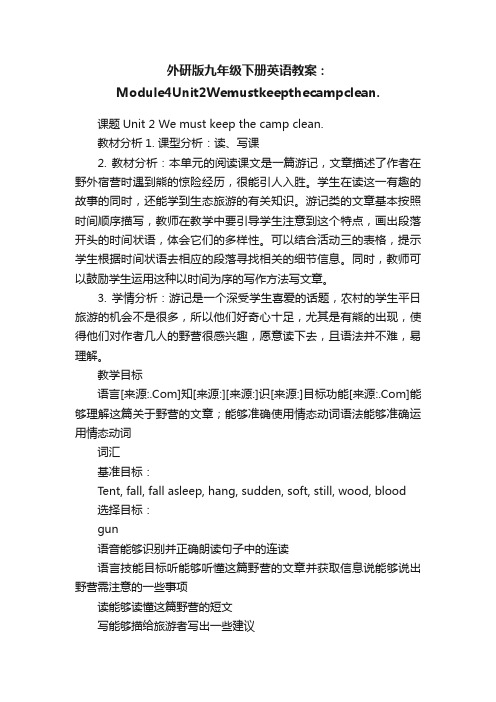
外研版九年级下册英语教案:Module4Unit2Wemustkeepthecampclean.课题Unit 2 We must keep the camp clean.教材分析1. 课型分析:读、写课2. 教材分析:本单元的阅读课文是一篇游记,文章描述了作者在野外宿营时遇到熊的惊险经历,很能引人入胜。
学生在读这一有趣的故事的同时,还能学到生态旅游的有关知识。
游记类的文章基本按照时间顺序描写,教师在教学中要引导学生注意到这个特点,画出段落开头的时间状语,体会它们的多样性。
可以结合活动三的表格,提示学生根据时间状语去相应的段落寻找相关的细节信息。
同时,教师可以鼓励学生运用这种以时间为序的写作方法写文章。
3. 学情分析:游记是一个深受学生喜爱的话题,农村的学生平日旅游的机会不是很多,所以他们好奇心十足,尤其是有熊的出现,使得他们对作者几人的野营很感兴趣,愿意读下去,且语法并不难,易理解。
教学目标语言[来源:.Com]知[来源:][来源:]识[来源:]目标功能[来源:.Com]能够理解这篇关于野营的文章;能够准确使用情态动词语法能够准确运用情态动词词汇基准目标:Tent, fall, fall asleep, hang, sudden, soft, still, wood, blood 选择目标:gun语音能够识别并正确朗读句子中的连读语言技能目标听能够听懂这篇野营的文章并获取信息说能够说出野营需注意的一些事项读能够读懂这篇野营的短文写能够描给旅游者写出一些建议学习策略自学策略利用网络资源搜集一些用英文描述的旅游场所的注意事项合作学习策略能够与同学用英语交流旅游时的注意事项文化意识通过学习,了解野外宿营时的注意事项情感态度学会用恰当的方式给旅游者提出一些建议教学重点To learn some rules and suggestions in the passage. 教学难点To get information from the article.教学媒体多媒体课件单机版网络教学光盘教学方法本单元的教学以任务型教学法为主,以视听教学法、互动教学法为辅,各个难度任务布置贯穿于教学始终,教师在每个教学环节中巧妙设置情境,力求使学生在真实的语境中感知语言的发生和运用,通过师生互动,生生互动等活动方式,学生产生由观察、倾听、理解到运用的变化,从而内化语言知识和技能,促进教学目标的达成。
